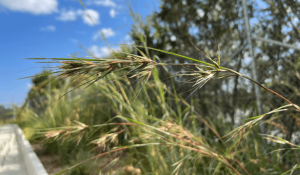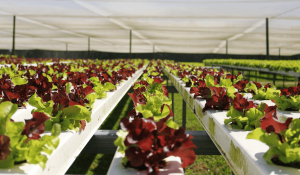Picture this, you’re on your lunch break at work and take the lift to the top floor and emerge into a beautiful green oasis. It doesn’t sound too shabby now, does it?! Not only is a rooftop garden a beautiful place to enjoy your lunch but being surrounded by and exposed to nature is hugely beneficial to mental and physical health.
Just outside the city in the Brisbane suburb of Rocklea, more than 30 edible plants are thriving on top of Green Endeavour’s (GE) three-storey building. This newly built warehouse acts as a Distribution Centre for wholesale and retail customers scattered far and wide throughout Queensland and New South Wales.
The rooftop garden aligns strongly with the GE sustainability value. This value represents the vision for the company to build safe and sustainable teams to ensure a great work-life balance, lower our environmental impact and maintain a balance between people, the planet, and profits.

The garden features seasonal crops, including Broad Beans, Sunflowers, Thai Basil, Edible Flowers, Garlic Chives, Betel Leaf, Jester Lettuce and Broccolo Fiolaro di Creazzo’ Filius’. Not sure what Broccolo Fiolaro di Creazzo is? It is a fantastic crop maintained on local Italian farms for centuries. It is on the Slow Food Ark of Taste list, a living catalogue of delicious and distinctive foods facing extinction.
Rooftop gardens not only look amazing, but they also have several other advantages, including increasing mood and educational opportunities as well as being great for the environment. France, Switzerland, and Canada have recognised these incredible benefits and have all passed laws regulating and demanding that new commercial and residential buildings have at least a partly green rooftop (Treescience, 2021). Could Australia take a page out of North America and Europe’s books?
The Benefits of a Rooftop Garden
Education

Many of us have lost touch with how food grows and where it originates. Growing edible plants allows people to engage with and understand food provenance and even appreciate it more. Not to mention the satisfaction of eating something fresh from the garden!
“Rooftop gardens demonstrate that food can be grown anywhere! Edible rooftop gardens, in particular, reconnect people with the food they eat and demonstrate the potential for productive habitats in the middle of the city.” – Ellia Guy, Future Wild.
Education is a core value for the members of Green Endeavour, and this rooftop garden has increased its capacity to educate its customers and internal teams. The space was created to inspire and empower both in person with regular masterclasses and cooking demonstrations using what is grown. A local school also visited for a tour and checked out the facility. The rooftop garden was a crowd favourite, particularly as many of the kids were considering a career in Agriculture.
Despite seeing the cityscape from the roof, it still feels like you’re away from the hustle and bustle. It serves as a great source of culinary inspiration and empowers people to give growing their own food at home a go.
While this isn’t a replacement for going out and connecting with nature, it does allow people who may not have the time or ability to experience a little piece of it at work.
Happiness
Remember, as a kid, your parents would tell you to get out of the house and play in the yard because it was “good for you”? Well, they were definitely on to something! Leading Environmental Psychology researchers state that there is a strong association between nature experiences and increased psychological well-being (Chomley, 2021).
Two theories support this:
- The Biophilia Hypothesis refers to humans’ innate need to affiliate with the natural environment within which they have evolved (Wilson, 1984).
- Attention Restoration Theory suggests that mental fatigue and concentration can be improved by time spent in or looking at nature (Rachel & Stephen Kaplan, 1995).
Along with mental health, physical health was also found to improve when in green spaces, as better air quality assists respiration and reduces stress (Chomley, 2021).
Green spaces are also an opportunity to foster social connections. They provide a place for relaxation and social connection, and Green Endeavour team members in particular, love having their morning coffee and chatting up there.
So, what’s the main takeaway? Well, it’s that green space at work increases productivity, promotes socialisation, and benefits the overall well-being of teams.

Employee Engagement
If employees are happy, the business will perform better. It’s as simple as that! A positive work environment leads to more engaged employees, and according to (Forbes, 2019), highly engaged teams show 21% greater profitability.
Disengagement is costly. Studies by the Queens School of Business and the Gallup Organization indicated that disengaged workers had 37% higher absenteeism, 49% more accidents, and 60% more errors and defects. Organisations with low employee engagement scores experienced 18% lower productivity, 16% lower profitability, 37% lower job growth, and 65% lower share price over time.
The studies concluded that engaged employees show up daily with passion, purpose, presence, and energy. Green Endeavour’s rooftop garden aims to inspire and engage employees through the joy of real food.
Sustainability

Effective Rainwater Usage
The environment gives us rainwater for free, and rooftop gardens are a great way to ensure we make the most of it. Plants use rainwater immediately and often store the excess to be used later.
Thanks to Future Wild (you will hear more about them soon!), the edible plants on Green Endeavour’s rooftop sit in Biofilta Foodcube wicking beds. They are made in Australia from food-grade polypropylene, 80% of which is recycled material sourced from the confectionary industry in Australia. Wicking beds ensure water efficiency as the plant only uses the water they need and stores the remainder, which decreases overall water usage. So, whenever the plants need a drink, they simply take a quick sip from the water stored at the bottom of the wicking bed. Self-regulated watering and no waste. Pretty neat, hey?
Urban Heat Island (UHI) Effect Control
An impressive benefit of rooftop gardens is their positive effect on the Urban Heat Island Effect (UHI). The UHI effect refers to the increased temperature levels in urban areas due to the sun heating concrete faster than it would trees and plants (Treescience, 2021). As cities and urban areas have an abundance of concrete, the area becomes a ‘heat island’, which increases the need for air conditioning or other cooling technologies (Treescience, 2021).
Rooftop gardens have been shown to decrease the UHI effect, leading to urban cooling and increasing buildings’ energy efficiency.
Increased Biodiversity
Most urban environments lack green spaces and habitats for wildlife. Gardens, especially those with a decent variety of plants, provide birds, insects and other pollinators a valuable habitat in urban spaces.
Pollinator patches are one of the ways Green Endeavour has contributed to urban biodiversity. Growing a mini resilient ecosystem on the rooftop encourages ‘good bugs’ into the garden. This helps keep pests or ‘bad bugs’ in check and ensures the food crops stay healthy and pest free without relying on chemicals that would deter both the good and the bad. These patches also provide a foraging habitat and food to many insects, increasing biodiversity.
Future Wild

Green Endeavour’s edible rooftop garden was brought to life by the amazing Ellia Guy from Future Wild. Future Wild is a local business that envisions cities transformed into a verdant mosaic of edible gardens and native habitat patches. They grow seasonal, organic produce using locally sourced compost and organic inputs.
Future Wild strives to create a greener future by using urban spaces to their full potential, whether bare concrete footpaths, disused parking lots and empty verges and backyards or rooftops in Green Endeavour’s case.
Ellia Guy from Future Wild works closely with Green Endeavour Director Graeme Twine, Specialty Buyer Tabitha Thomson, and the chefs they supply to create a productive rooftop garden that provides chefs access to hard-to-source crops, creating a dialogue around local food production. The rooftop garden demonstrates how even inner-city areas can be productive, sustainable, and beautiful.
Green Endeavour’s rooftop garden is an active step, not to mourn the nature that was but create the nature that could be. The goal is to transform areas that would have otherwise been bare or unproductive landscapes to reconnect people with biodiversity, seasonality and stewardship and ultimately create a positive working environment.
Hear more about Elia and Future Wild in this Suncoast Fresh Podcast episode here.
References
Garside, R. (2023). Attention Restoration Theory: A systematic review. European Centre for Environment & Human Health. https://www.ecehh.org/research/attention-restoration-theory-a-systematic-review/#:~:text=Attention%20Restoration%20Theory%20(ART)%20(,in%20’directed%20attention%20fatigue’
Guy, E. (2023). Future Wild. https://www.futurewild.com.au/
Living Future Institute of Australia. (2023). WHAT IS BIOPHILIA?. Living Future Institute of Australia. https://living-future.org.au/biophilia/
Scardifield, M. (2019, October 18). Urban farming: the new big trend hitting Australian cities. Delicious. https://www.delicious.com.au/food-files/news-articles/article/grow-garden-small-space/iulfmybc
Treescience. (2021). BENEFITS OF ROOFTOP GARDENS. Treescience. https://treescience.com.au/blog/benefits-rooftop-gardens/



